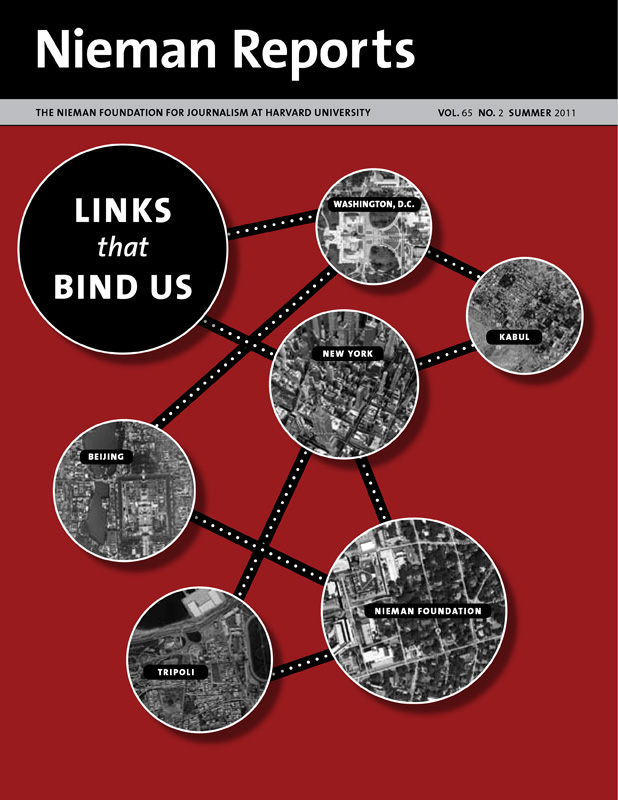
Links that Bind Us
In digital space, journalists are proving to be a powerful force in creating, nurturing and engaging communities. No longer serving only geographic zones, they confront the fragmentation of audience and the need to attract and retain “eyeballs.” Their efforts to embrace and interact with communities are fueled by an instinct to survive. Habits and hobbies, interests and values, political leanings, and sports allegiances are the grist of community formation. Discover the various roles journalists are assuming and how the links we share bind us.
While much attention is focused on how to "fix" journalism, the bigger problem is fixing advertising to pay for the news. For me, Detroit143 is, in part, about  reinventing what advertising is and how it is sold so it can again pay for journalism. In Detroit143, we want to demonstrate how a serious news organization can be a business success. In doing this, we will also be providing Detroit businesses with tools to drive their financial success, thus helping support Detroit's economic survival.
reinventing what advertising is and how it is sold so it can again pay for journalism. In Detroit143, we want to demonstrate how a serious news organization can be a business success. In doing this, we will also be providing Detroit businesses with tools to drive their financial success, thus helping support Detroit's economic survival.
My journey to this viewpoint began when I was a reporter in the 1970's for the Detroit Free Press. During the next two decades I started a magazine in Detroit and, backed by a rich Minnesotan, built a newspaper, magazine and media group with some 1,200 employees. In the process, I learned about the economics of the news business. Then the Web arrived with a clear message—it was going to alter the equations that had made print publishing a dependable money machine.
The Web made traditional advertising progressively less effective. Ads had relied on publishers' ability to attract audiences with valuable, relevant content (i.e., the news) and then interrupt it with commercial messages (i.e., ads) that often were an irrelevant nuisance. The Web disrupted things by making it extremely easy for audiences to consume content while blocking, avoiding, evading and ignoring ads. By 2010, total annual print and online ad revenue for U.S. newspapers had fallen to $25.8 billion, down $23.6 billion or 48 percent from the peak year of 2005.
RELATED ARTICLES
“Focusing a New Kind of Journalism on a City's Needs”
- Bill Mitchell
“A Promising Collaboration of Place, Time and Niche”
- Lynette Clemetson
“A New Partnership to Build a Common Understanding”
- Shirley Stancato Audience control over content means advertising now has to be just as valuable, engaging and sought-after as news and entertainment. To garner attention, it has to be worthwhile and useful—valuable and original stories, usable tools and apps, engaging games, and more. In founding and running an independent digital agency, Story Worldwide, that creates such content to promote brands and publishes it across media, I've been able to demonstrate that all this content-marketing stuff really works.
Detroit143 will abandon traditional ad sales and instead build a content-focused agency. Instead of only selling space on the site, Detroit143 Agency will sell advertising services. Much of what the agency will create may not even appear on Detroit143, but it will produce revenue for the site. The Detroit143 Agency will work with advertisers to find the best stories of their brands and tell them across media platforms—digital, social, print. Revenue will come mostly from selling services: planning content strategies, creating stories, and distributing advertisers' original content to attract the largest possible audience for their brands.
Making this advertising strategy work depends on us using the same management skills, storytelling talent, and social media smarts demanded by our core business—journalism. Using these efficient, low-cost social marketing skills will be advantageous for Detroit's business community.
Some journalists might conclude that this is about little more than creating phony news stories for advertisers. Not true. Doing that would prove to be unprofitable, self-defeating and wrong. Detroit143 intends to leverage what we know how to do to sustain what we want to do.
Kirk Cheyfitz is the CEO and chief editorial officer of Story Worldwide and a former city-county bureau chief of the Detroit Free Press.
 reinventing what advertising is and how it is sold so it can again pay for journalism. In Detroit143, we want to demonstrate how a serious news organization can be a business success. In doing this, we will also be providing Detroit businesses with tools to drive their financial success, thus helping support Detroit's economic survival.
reinventing what advertising is and how it is sold so it can again pay for journalism. In Detroit143, we want to demonstrate how a serious news organization can be a business success. In doing this, we will also be providing Detroit businesses with tools to drive their financial success, thus helping support Detroit's economic survival.My journey to this viewpoint began when I was a reporter in the 1970's for the Detroit Free Press. During the next two decades I started a magazine in Detroit and, backed by a rich Minnesotan, built a newspaper, magazine and media group with some 1,200 employees. In the process, I learned about the economics of the news business. Then the Web arrived with a clear message—it was going to alter the equations that had made print publishing a dependable money machine.
The Web made traditional advertising progressively less effective. Ads had relied on publishers' ability to attract audiences with valuable, relevant content (i.e., the news) and then interrupt it with commercial messages (i.e., ads) that often were an irrelevant nuisance. The Web disrupted things by making it extremely easy for audiences to consume content while blocking, avoiding, evading and ignoring ads. By 2010, total annual print and online ad revenue for U.S. newspapers had fallen to $25.8 billion, down $23.6 billion or 48 percent from the peak year of 2005.
RELATED ARTICLES
“Focusing a New Kind of Journalism on a City's Needs”
- Bill Mitchell
“A Promising Collaboration of Place, Time and Niche”
- Lynette Clemetson
“A New Partnership to Build a Common Understanding”
- Shirley Stancato Audience control over content means advertising now has to be just as valuable, engaging and sought-after as news and entertainment. To garner attention, it has to be worthwhile and useful—valuable and original stories, usable tools and apps, engaging games, and more. In founding and running an independent digital agency, Story Worldwide, that creates such content to promote brands and publishes it across media, I've been able to demonstrate that all this content-marketing stuff really works.
Detroit143 will abandon traditional ad sales and instead build a content-focused agency. Instead of only selling space on the site, Detroit143 Agency will sell advertising services. Much of what the agency will create may not even appear on Detroit143, but it will produce revenue for the site. The Detroit143 Agency will work with advertisers to find the best stories of their brands and tell them across media platforms—digital, social, print. Revenue will come mostly from selling services: planning content strategies, creating stories, and distributing advertisers' original content to attract the largest possible audience for their brands.
Making this advertising strategy work depends on us using the same management skills, storytelling talent, and social media smarts demanded by our core business—journalism. Using these efficient, low-cost social marketing skills will be advantageous for Detroit's business community.
Some journalists might conclude that this is about little more than creating phony news stories for advertisers. Not true. Doing that would prove to be unprofitable, self-defeating and wrong. Detroit143 intends to leverage what we know how to do to sustain what we want to do.
Kirk Cheyfitz is the CEO and chief editorial officer of Story Worldwide and a former city-county bureau chief of the Detroit Free Press.



